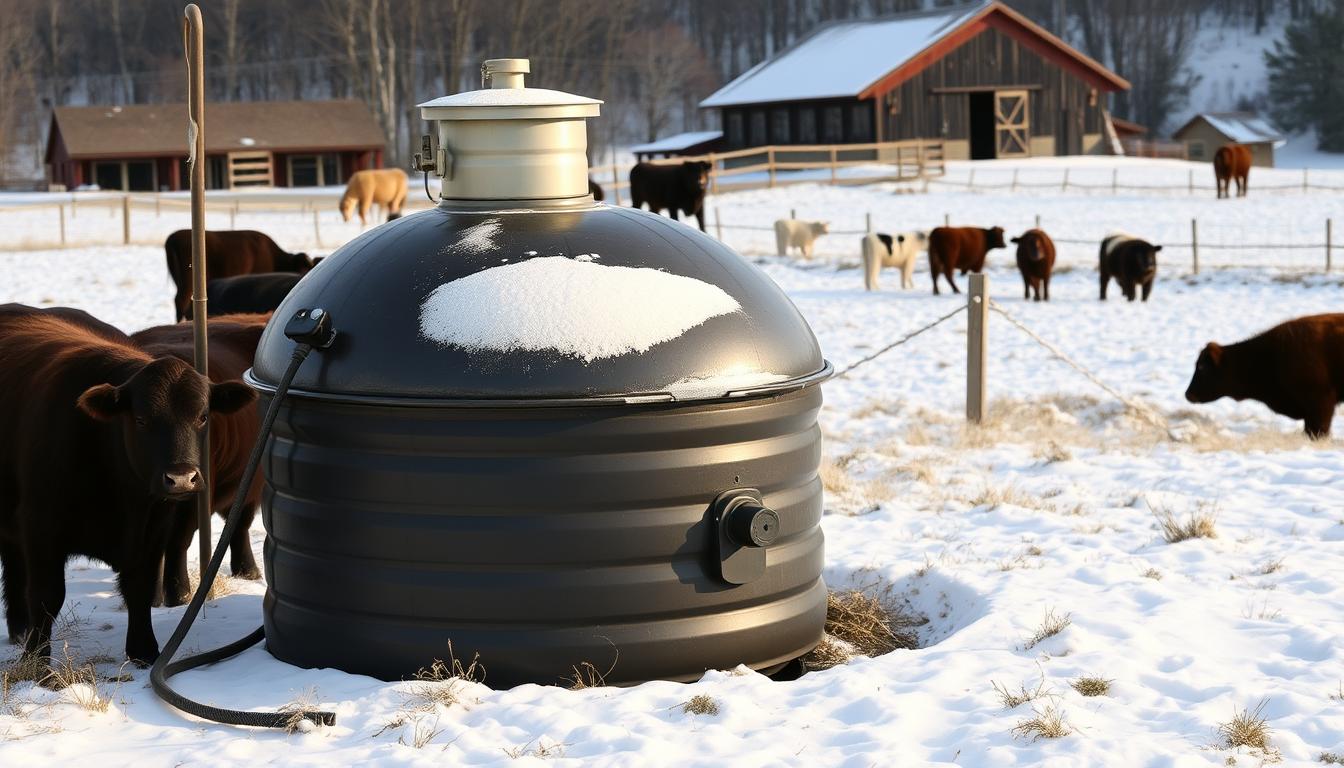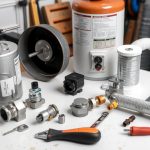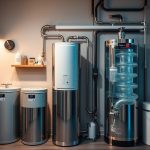The cold winter winds sweep across the pasture, reminding me of my grandfather’s struggles with frozen water troughs. As a rancher’s daughter, I learned early that a reliable cattle water heater is more than just equipment. It’s a lifeline for keeping livestock alive.
Winter poses a big challenge for ranchers, mainly in keeping water from freezing. A strong ranch water tank heater can be the difference between healthy cattle and loss. Today, farmers have many ways to keep water from freezing and keep their herds hydrated.
Choosing the right cattle water heater means knowing your farm, cattle, and climate. The market offers everything from electric to solar-powered options. These help keep water accessible even when it’s freezing.
Key Takeaways
- Cattle water heaters are critical for livestock health in winter
- Multiple heating technologies provide flexible solutions
- Energy efficiency is a key consideration when selecting heaters
- Proper installation prevents equipment failure
- Regular maintenance extends heater lifespan
Importance of Cattle Water Heaters in Winter

Winter is tough for taking care of livestock, mainly because of keeping them hydrated. Water warmers for farms are key to keeping animals healthy and working well in the cold.
Knowing how important cattle trough heaters are can change how you manage your farm in winter. Water is vital for cattle, with them needing about seven pounds of water for every pound of food.
Enhancing Livestock Health
Keeping cattle hydrated is key to their performance. Water should be between 37°F to 65°F to help digestion. Cold water can mess with digestion, making it harder for them to digest food.
- Ideal water temperature supports metabolic functions
- Prevents dehydration during winter months
- Supports overall livestock immunity
Preventing Water Freezing
Farm water heaters stop water from freezing in very cold weather. Cattle like drinking from tanks more than from natural sources, preferring them 75% to 90% of the time.
| Cattle Type | Daily Water Requirement |
|---|---|
| Lactating Beef Cow | 12 gallons |
| Lactating Dairy Cow | 35-45 gallons |
Improving Feeding Efficiency
Keeping water at a steady temperature helps cattle eat better. Good automatic watering systems save money and help cattle perform better.
“Choosing a durable, quality automatic cattle waterer can significantly reduce manual labor during freezing temperatures.” – Agriculture Management Experts
Getting reliable water warmers for farms keeps your animals healthy, hydrated, and working well all winter.
Types of Cattle Water Heaters
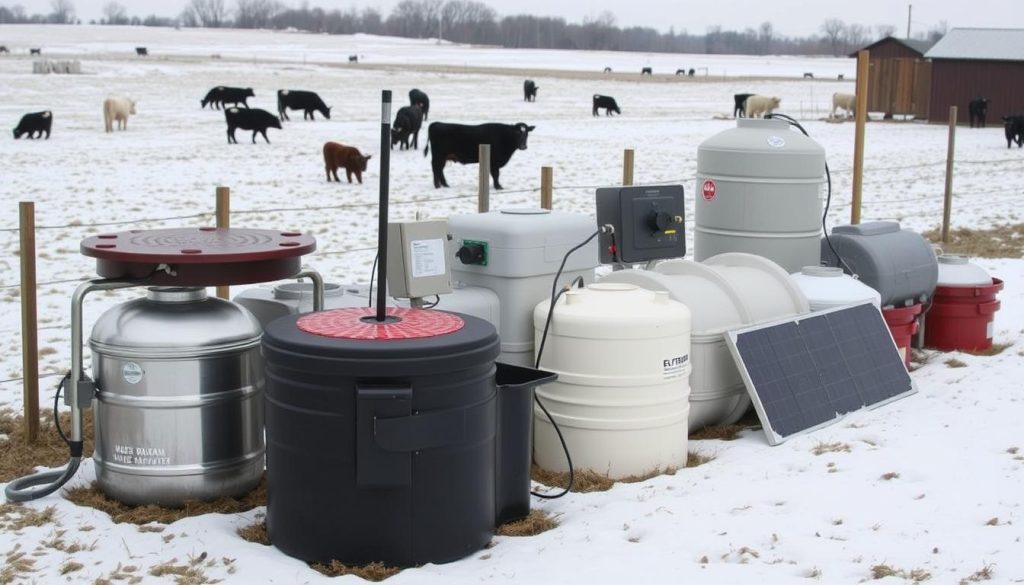
Choosing the right water heater for animals is key to keeping them healthy in cold weather. Farmers have many options for heating water for their cattle.
There are various water heating solutions for farms. Knowing about each type helps farmers pick the best for their animals’ water needs.
Electric Water Heaters
Many ranchers choose electric water heaters. They heat water well and come in different styles:
- Floating heaters for stock tanks
- Submersible models for deeper containers
- Drain plug-style heaters for easy installation
Solar-Powered Heaters
Solar-powered heaters are becoming more popular, mainly in areas without electricity. They use the sun’s energy to keep water warm.
Propane Heaters
Propane heaters are great for big water tanks. They use propane, which works well in very cold weather.
| Heater Type | Best For | Energy Efficiency |
|---|---|---|
| Electric | Small to Medium Herds | Moderate |
| Solar | Remote Locations | High |
| Propane | Large Herds | Variable |
“Choosing the right water heater can mean the difference between a healthy herd and livestock challenges.” – Agricultural Water Management Expert
Curt Cline in Albany, Ohio, shows how important water heating is. His 75-head cattle operation uses automatic waterers that keep water from freezing, even at -15°F. This highlights the vital role of proper water heaters for animals.
Features to Consider When Buying a Cattle Water Heater

Choosing the right water heater for your cattle is important. It helps keep them healthy during cold weather. Ranch water tank heaters are key for this.
When picking a dairy water heating solution, look at its performance. It should make sure your animals always have access to warm water.
Heating Capacity and Size
The size of the tank affects the heater you need. Here’s a guide for different tank sizes:
- Less than 70 gallons: 500 watts
- 70-100 gallons: 1,000 watts
- 100-300 gallons: 1,500 watts
Energy Efficiency Considerations
Choosing the right heater can save you money. Stock tank heaters use about 1500 watts. This can cost around $125 a month if used all the time.
| Heater Type | Watts | Monthly Cost | Efficiency Rating |
|---|---|---|---|
| Floating Deicer | 500-1500 | $50-$125 | High |
| Drain Plug Heater | 250-1500 | $35-$100 | Medium |
Critical Safety Features
Look for safety features in ranch water tank heaters. These are important:
- Automatic temperature shut-off
- Low-water protection
- Grounding mechanisms
- Protective cord coverings
“Proper electrical setup prevents risks and keeps animals warm in winter.”
Pro tip: Always get an electrician to install it for safety and best performance.
Energy Efficiency in Cattle Water Heaters
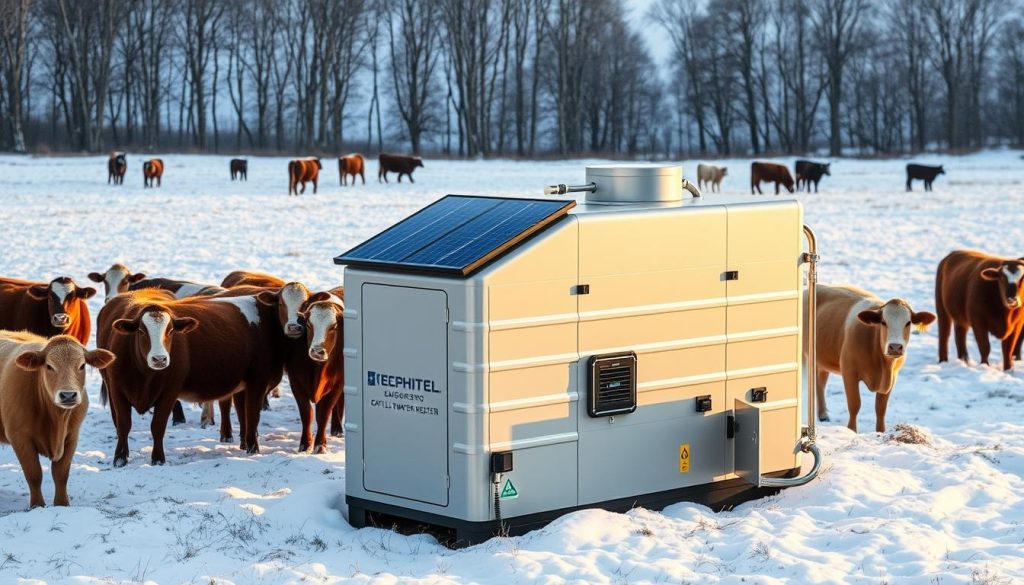
Farmers looking to save money should focus on energy-efficient cattle water heaters. These modern heaters help cut down costs. They keep livestock hydrated even in cold winter months.
To understand energy efficiency in farm water heaters, we need to look at a few key things:
- Thermal performance characteristics
- Insulation quality
- Power consumption metrics
- Long-term operational expenses
Importance of Energy Savings
Energy-efficient cattle water heaters can cut down electricity use a lot. Here are some interesting facts:
- Insulation can reduce standby heat losses by 25% to 45%
- Potential water heating cost reductions of 4% to 9%
- Electric water heaters demonstrate thermal efficiency around 98%
“Efficient water heating isn’t just about immediate savings—it’s an investment in sustainable agricultural practices.”
How to Choose an Energy-Efficient Model
Choosing the right agricultural water warmer involves looking at several things:
- Energy Factor (EF) Ratings: Seek models with higher EF ratings
- Thermal efficiency percentages
- Standby heat loss measurements
- Compatibility with your specific livestock requirements
Producers should look for water heaters that use less power. Propane, solar, and advanced electric models are great for farms.
Best Brands for Cattle Water Heaters

Choosing the right cattle trough heater is key for managing livestock in cold weather. Farmers need warmers that can handle extreme temperatures and work well all the time.
The market has many great bovine water heating systems for different farms. Let’s look at the top brands known for their reliability and new ideas.
Pioneer Products: Durability in Extreme Conditions
Pioneer Products makes tough cattle water heaters for tough farm conditions. Their heaters have:
- High-performance heating elements
- Corrosion-resistant materials
- Long-lasting operation
Farm Innovators: Electric Heating Solutions
Farm Innovators offers electric cattle trough heaters in various wattages. They have:
- Adjustable temperature controls
- Energy-saving models
- Compact design for easy setup
K & H Pet Products: Efficient Compact Systems
K & H Pet Products has special warmers for small livestock farms. Their products focus on:
- Compact, space-saving designs
- Low power use
- Consistent heating
*”Choosing the right water heating system is key for keeping livestock healthy in winter.”*
Other well-known brands like Ritchie, Canarm, and Miraco offer unique features for different farms. Farmers should think about their needs, climate, and budget when picking a bovine water heating system.
How to Install a Cattle Water Heater Safely
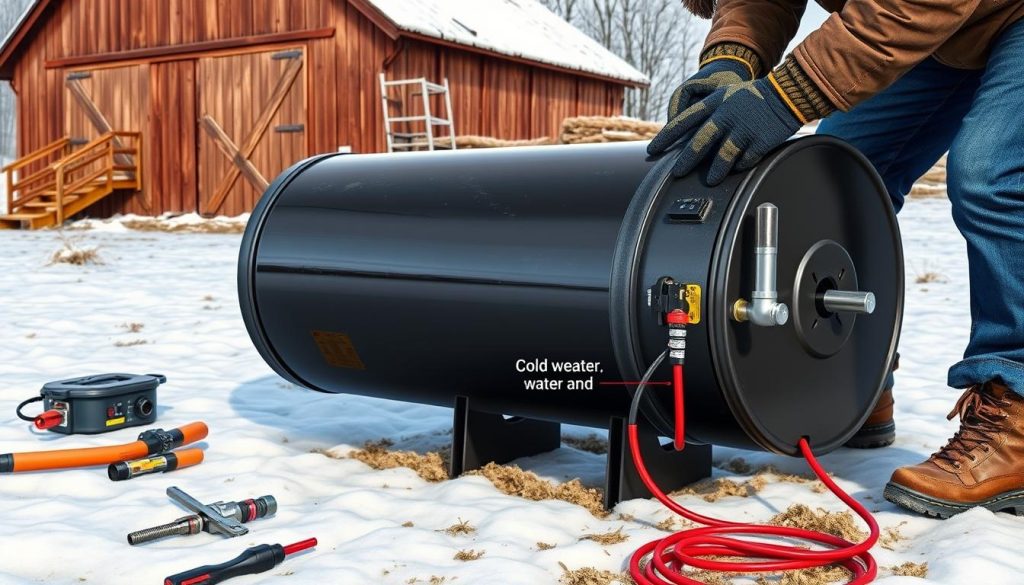
Installing pasture water tank heaters needs careful planning and safety focus. Dairy water heating solutions must be set up precisely. This ensures effective heating for livestock and their well-being.
Before starting, collect all necessary tools and materials. This ensures a smooth setup. Proper preparation helps avoid problems during the installation of livestock water heating equipment.
Essential Tools and Materials
- Waterproof electrical connectors
- Protective electrical conduit
- GFCI outlet
- Grounding rod
- Copper wire
- PVC piping
- Circuit breaker
Step-by-Step Installation Guide
- Select a level area near your water source
- Prepare a minimum 4-inch thick concrete platform
- Ensure concrete extends 18 inches from each side of the unit
- Install a GFCI outlet with proper grounding
- Connect water heater using waterproof electrical connections
- Protect electrical cords with PVC piping
- Verify water pressure does not exceed 60 psi
“Safety is key when installing water heating solutions for livestock.” – Agricultural Equipment Experts
Important safety tips include avoiding extension cords and checking electrical parts often. Many old barns need updated outlets to meet safety standards.
Manufacturers suggest grounding troughs and doing annual safety checks. This protects animals and ensures reliable water heating in cold months.
Maintenance Tips for Cattle Water Heaters

Keeping your ranch water tank heater in good shape is key during cold winter months. Taking care of it helps it work better and last longer. It also stops sudden breakdowns that could harm your animals.
Regular Cleaning Practices
There are a few important steps for regular upkeep:
- Use a baking soda and vinegar mix to remove mineral buildup
- Look for any damage on electrical parts
- Check cords and connections for wear
- Clean the outside to stop corrosion
*Regular upkeep can stop up to 70% of equipment failures.*
Troubleshooting Common Issues
Farmers should know how to fix common problems fast:
- Check circuit breakers if the heater stops working
- Make sure the thermostat is working right
- Look at insulation around water tanks
- Have spare heaters ready for emergencies
It’s important to protect your cattle water heater from harm. Use PVC tubing to cover electrical cords from animals. This helps avoid electrical dangers and makes your equipment last longer.
Experts say it’s a good idea to have your ranch water tank heater checked by a pro now and then. This way, you can find and fix problems before they get worse.
Cost Factors of Cattle Water Heaters
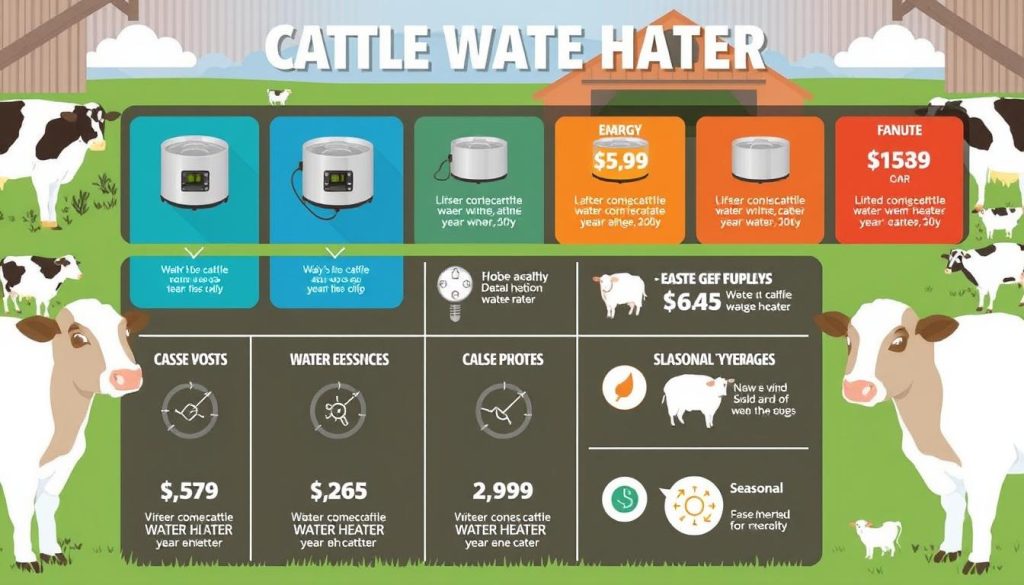
Understanding the cost of farm water heaters is key for farmers. Cattle trough heaters are a big expense. Farmers need to look at both the initial cost and ongoing expenses to choose wisely.
Initial Purchase Price
The price of cattle water heaters changes based on several factors:
- Basic non-automatic waterers: $20 – $50
- Automatic cattle waterers: $100 – $500
- Advanced heated waterers: $200 – $1,000
- Specialized energy-free systems: Can exceed $1,000
Long-Term Operating Costs
Energy costs for water heating can really add up. Dairy farms report that energy costs average $138 per cow annually. The type of energy used affects costs:
| Energy Source | Cost Efficiency |
|---|---|
| Electricity | Higher operating costs |
| Propane | Mid-range expenses |
| Solar | Lower long-term costs |
“Water heating is the most energy-intensive function on modern dairy farms” – Agricultural Energy Experts
Maintenance costs are also important. This includes parts, cleaning agents, and labor. Brands like Ritchie, Miraco, and Behlen offer models from $200 to over $1,500. This helps farmers find options that fit their budget.
Climate Considerations for Cattle Water Heaters

Winter water management for livestock is a big challenge. Farmers need to plan carefully and use the right bovine water heating systems. Choosing the right pasture water tank heaters is key to keeping animals healthy and farms productive.
Different climates need special dairy water heating solutions. Cattle must have enough water, with at least 20 gallons per day for every 1,000 pounds of body weight.
Adaptability to Different Weather Conditions
Choosing the right water heating system is important. It depends on several factors:
- Regional temperature ranges
- Typical winter precipitation levels
- Livestock breed and water consumption patterns
- Available energy sources on the farm
“The key to successful winter water management is understanding your specific climate and livestock needs.” – Agricultural Water Management Expert
Insulation Techniques
Good insulation is key for bovine water heating systems. Farmers can use several methods to keep water warm and prevent it from freezing:
- Use insulated water tank enclosures
- Install geothermal heat exchange systems
- Implement floating ball mechanisms to reduce heat loss
- Create windbreak structures around water sources
Innovative farmers have found that smart insulation can cut energy use by up to 40% in pasture water tank heaters. This makes winter water management both efficient and affordable.
Comparison: Electric vs. Propane Water Heaters
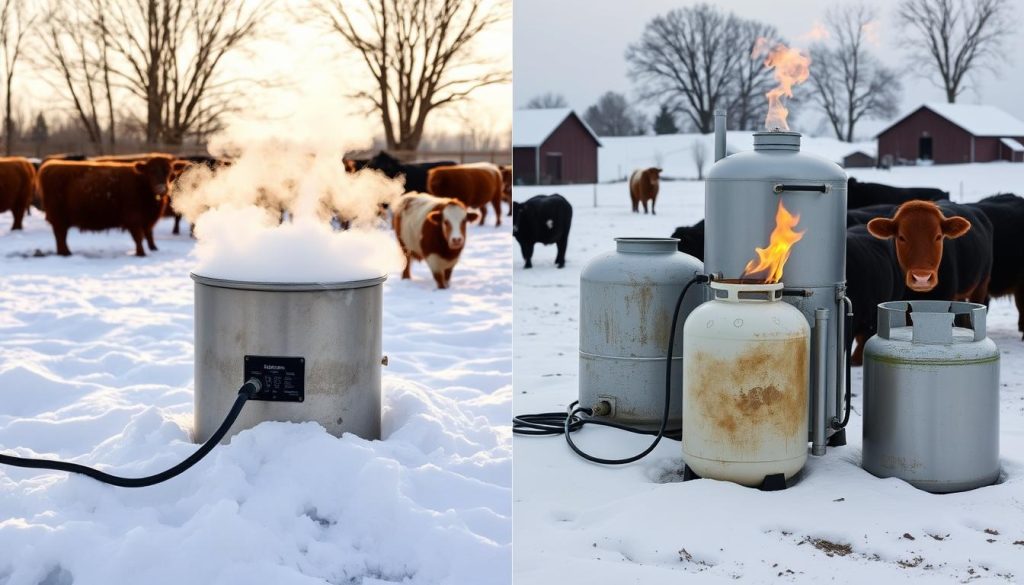
Choosing the right cattle water heater is key to keeping livestock healthy in cold weather. Farmers must decide between electric and propane water heaters for their ranch needs.
Cost-Effectiveness and Efficiency
The market offers two main choices with their own benefits:
- Electric heaters are cheaper to install upfront
- Propane heaters work well in areas without electricity
- Gas heaters can last up to 20 years with care
“The right water heating solution can significantly impact farm operational efficiency and animal welfare.”
Convenience and Accessibility
Farmers need to think about several things when picking a heater:
- Electric heaters are easier to set up
- Propane models heat up faster
- Gas heaters work when the power is out
Electric heaters heat slower, but propane ones heat faster. Propane portable water heaters are very cost-effective for different farm settings.
| Feature | Electric Heaters | Propane Heaters |
|---|---|---|
| Initial Cost | Lower | Higher |
| Lifespan | 20+ years | 15-20 years |
| Operational Reliability | Dependent on electricity | Functional during outages |
Farmers should think about their specific needs, local energy costs, and current setup to choose the best water heating option.
Unique Innovations in Cattle Water Heater Technology
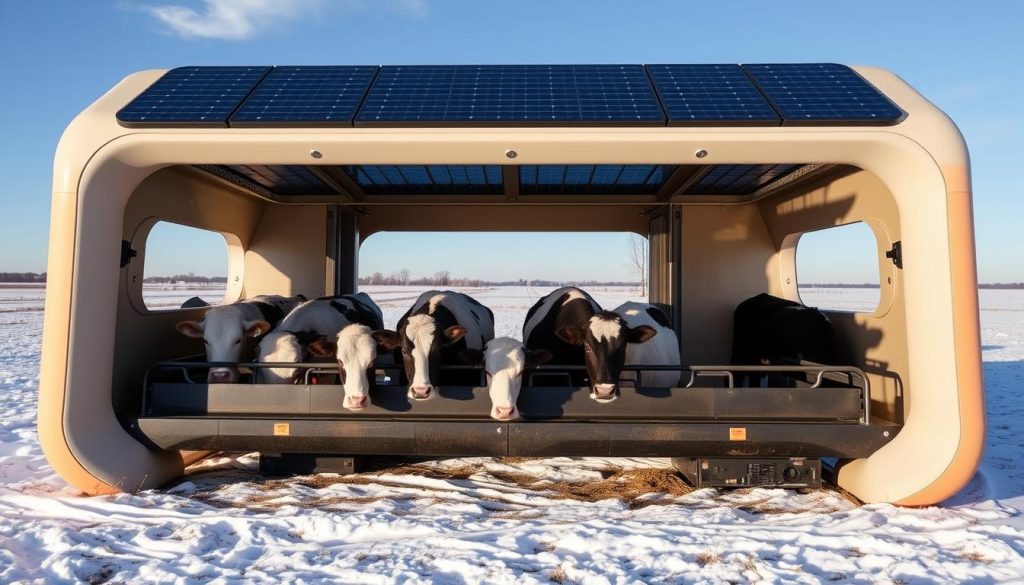
The agricultural water warmers industry is seeing big changes. Farmers now have access to top-notch farm water heaters. These heaters change how cattle get water in cold winter months.
Modern cattle trough heater designs are breaking new ground. Smart technologies are coming out that give farmers more control and monitoring options.
Smart Heater Features
Today’s agricultural water warmers have cool features for better farm management:
- Smartphone app integration for real-time monitoring
- Solar panel compatibility for energy efficiency
- Automated temperature regulation
- Advanced temperature sensing technology
Remote Monitoring Capabilities
Farm water heaters now have remote tracking solutions. These solutions change how we manage livestock water. Ranchers can:
- Check water temperature instantly
- Receive alerts about system issues
- Monitor energy consumption
- Track water usage patterns
“Technology is transforming how we manage agricultural water systems, making them smarter and more efficient than ever before.” – Agricultural Technology Experts
With Ranchbot technology costing just $1 a day, farmers can get advanced monitoring systems. These systems protect their livestock and save water resources.
Maximizing Water Heater Efficiency on Your Farm
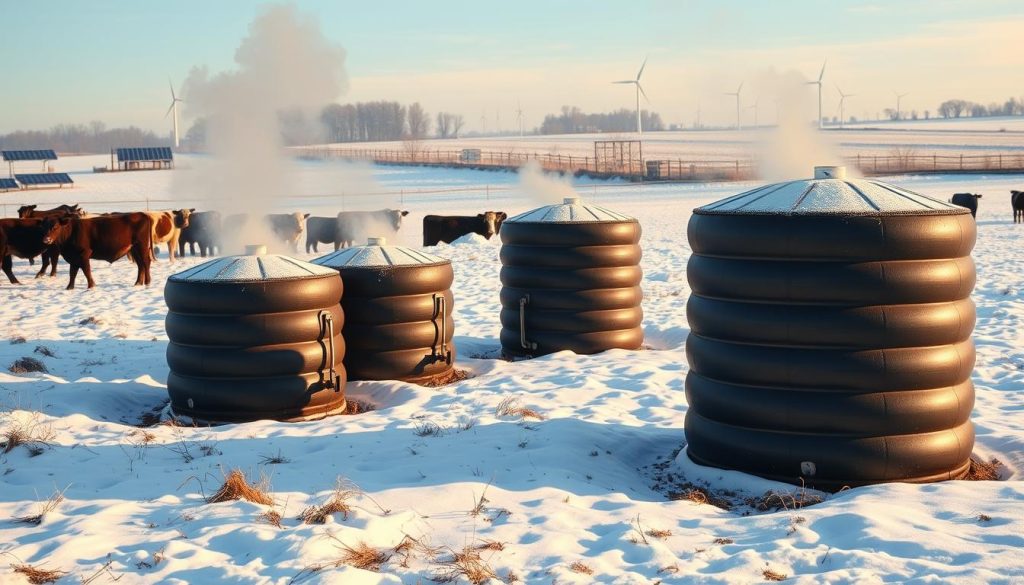
Keeping animal drinking water warmers efficient is key for farms in winter. Dairy and cattle farmers struggle to keep water systems working well while saving on energy.
By using smart strategies, farmers can cut down on energy use. Water heating can be up to 35% of a dairy farm’s electricity costs.
Best Practices for Winter Management
- Install high-efficiency insulation around water tanks
- Use weather-resistant enclosures to protect heating equipment
- Implement programmable thermostats for precise temperature control
- Conduct regular maintenance checks on water heating systems
Utilizing Insulation and Enclosures
Insulation is a big help in keeping water warm. Windbreaks and enclosures keep water at a steady temperature. This also saves energy.
| Efficiency Strategy | Potential Energy Savings |
|---|---|
| Comprehensive Tank Insulation | 15-25% Reduction |
| Windbreak Enclosures | 10-20% Energy Conservation |
| Programmable Thermostat | Up to 30% Cost Savings |
“Investing in efficient bovine water heating systems is not an expense, but a strategic long-term farm management decision.” – Agricultural Energy Experts
Pro tip: Consider using night-rate electricity and solar power to make your water tank heaters even more efficient.
Legal Regulations for Cattle Water Heaters
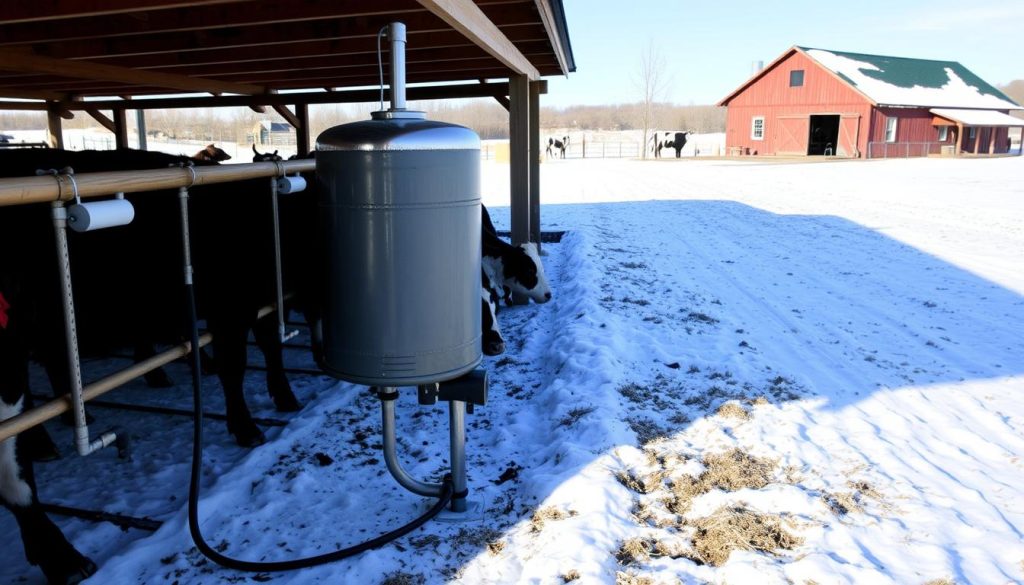
Understanding the laws for heating water for livestock is key. Farmers need to know the rules to keep their operations safe and legal.
- Electrical safety standards for livestock water heating equipment
- Energy consumption regulations
- Installation requirements for outdoor electrical systems
- Safety certification specifications
Compliance with National Standards
The market for cattle water heaters follows strict national safety rules. Makers must follow rules from groups like Underwriters Laboratories (UL) and the National Electrical Code (NEC). These rules make sure each heater is safe and works well.
“Safety compliance is not optional – it’s a fundamental requirement for agricultural equipment.” – Agricultural Safety Expert
Impact of Local Regulations
Local laws can change how you install and use cattle water heaters. Offices for agricultural extension offer important advice on local rules. Farmers should look into local electrical codes, zoning laws, and rules for farm equipment.
| Regulatory Aspect | Key Considerations |
|---|---|
| Electrical Safety | UL certification, grounding requirements |
| Energy Efficiency | Power consumption limits, energy ratings |
| Installation | Outdoor placement, protective enclosures |
Choosing a cattle water heater is more than just looking at how well it heats. Farmers must also think about following the law to protect their animals, equipment, and farm.
Customer Reviews: Top Cattle Water Heater Picks
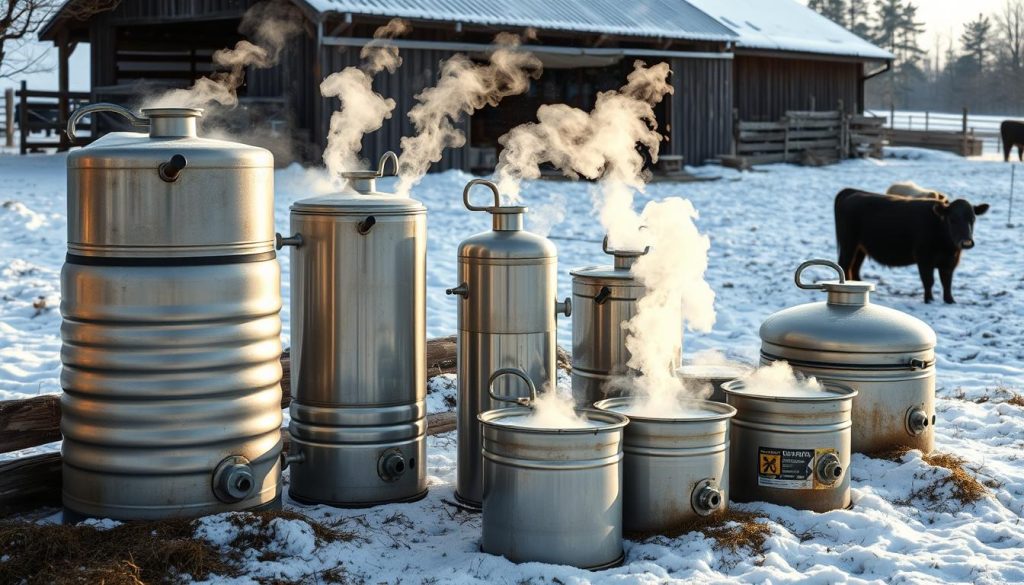
Farmers and ranchers need strong ranch water tank heaters for their animals in cold winter months. Choosing the best agricultural water warmers means looking at what others say and expert advice.
Our deep look into farm water heaters shows important points from real users in different farms.
Pros and Cons Analysis
Farmers talk about important things when they pick water heating solutions for their animals:
- Durability of heating elements
- Energy efficiency ratings
- Ease of installation
- Maintenance requirements
User Experience Insights
Feedback from users gives us great views on the best water heater models:
| Brand | Key Features | User Rating |
|---|---|---|
| Electric Waterer | Two-bowl design, polyurethane foam insulation | 4.5/5 |
| Tusker Trough | Multiple size options, quick drainage system | 4.7/5 |
| Energy-Free Waterer | Patented door closure, prevents freezing | 4.6/5 |
“Choosing the right water heater can make a big difference in managing livestock in winter.” – Agricultural Equipment Specialist
Farmers say to think about certain things when picking ranch water tank heaters. These include the local weather, how many animals you have, and what power you have.
- Prioritize models with strong insulation
- Consider how easy it is to maintain
- Check if it fits with what you already have
Buying top-notch agricultural water warmers means your animals always have water. This is key for their health in cold winters.
Making an Informed Decision on Cattle Water Heaters
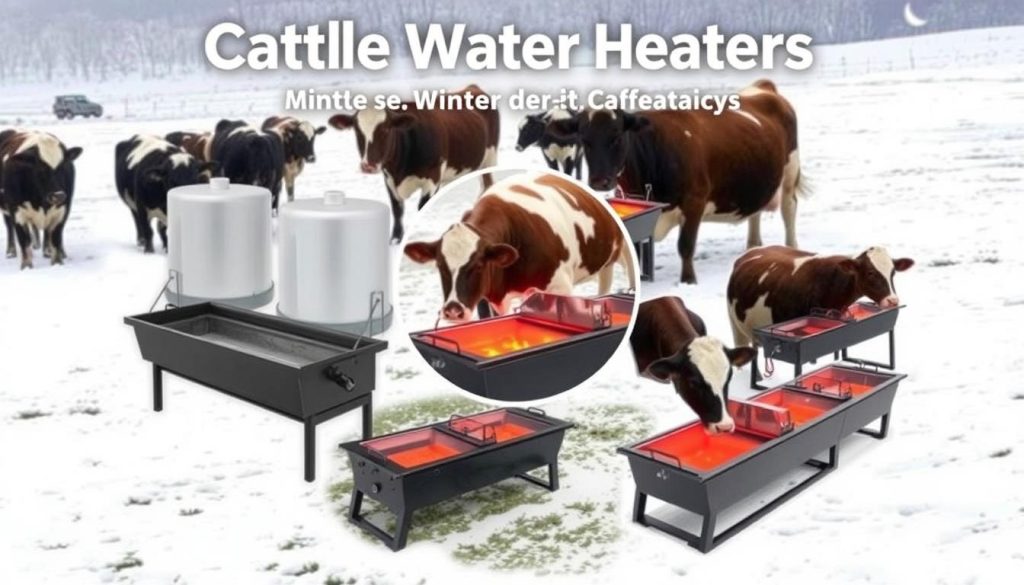
Choosing the right cattle trough heater is a big decision. Farmers need to think about many things to make sure their water warmers work well.
When looking at bovine water heating systems, there are key things to keep in mind:
- Assess your specific farm requirements
- Understand climate challenges
- Analyze power infrastructure
- Consider budget constraints
Evaluating Needs vs. Options
Looking at different water heater models is a big part of the process. Not all systems are created equal. Farmers should think about:
- Herd size and water consumption
- Local temperature variations
- Energy efficiency ratings
- Durability of materials
“The right water heating system can significantly impact livestock health and farm productivity.” – Agricultural Equipment Experts
Importance of Product Research
Doing deep research on products is very important. Metal waterers are very durable and can last for years. It’s good to compare features, read what others say, and talk to local experts.
Remember, what saves money in the long run is more important than the initial cost. Take the time to learn about each system’s special features. This will help you make a smart choice.
Conclusion: Choosing the Right Cattle Water Heater
Choosing the right water heater for your cattle is important. You need to think about your farm’s needs, like keeping cattle warm in cold weather. This ensures they stay healthy and hydrated.
Look for safety and energy-saving features when picking a heater. Modern systems need strong electrical grounding. This includes using GFCI outlets and grounding rods. It’s key to keep your cattle safe from shock.
Keeping your cattle warm in winter is a big deal. Think about how cold they can handle, how much water they need, and your farm’s weather. The right heater can keep them healthy, reduce stress, and make your farm run better in winter.
Final Recommendations
Look at different heaters and see how they work in cold. Choose ones that are reliable. Also, make sure you install and maintain them right, and know your local weather challenges.
Anticipating Seasonal Needs
Good farm managers plan ahead for changing weather. Have backup plans, check your equipment often, and be ready to adjust your heating. This keeps your cattle’s water at the right temperature all winter.
